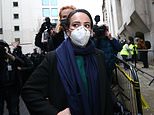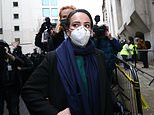WikiLeaks founder Julian Assange will find out TODAY if he will be extradited to the US

2006
Assange creates Wikileaks with a group of like-minded activists and IT experts to provide a secure way for whistleblowers to leak information. He quickly becomes its figurehead and a lightning rod for criticism.
2010
March: U.S. authorities allege Assange engaged in a conspiracy to hack a classified U.S. government computer with former Army intelligence analyst Chelsea Manning.
July: Wikileaks starts releasing tens of thousands of top secrets documents, including a video of U.S. helicopter pilots gunning down 12 civilians in Baghdad in 2007. What followed was the release of more than 90,000 classified US military files from the Afghan war and 400,000 from Iraq that included the names of informants.
August: Two Swedish women claim that they each had consensual sex with Assange in separate instances when he was on a 10-day trip to Stockholm. They allege the sex became non-consensual when Assange refused to wear a condom.
First woman claims Assange was staying at her apartment in Stockholm when he ripped off her clothes. She told police that when she realized Assange was trying to have unprotected sex with her, she demanded he use a condom. She claims he ripped the condom before having sex.
Second Swedish woman claims she had sex with Assange at her apartment in Stockholm and she made him wear a condom. She alleges that she later woke up to find Assange having unprotected sex with her.
He was questioned by police in Stockholm and denied the allegations. Assange was granted permission by Swedish authorities to fly back to the U.K.
November: A Swedish court ruled that the investigation should be reopened and Assange should be detained for questioning on suspicion of rape, sexual molestation and unlawful coercion. An international arrest warrant is issued by Swedish police through Interpol.
Wikileaks releases its cache of more than 250,000 U.S. diplomatic cables.
December: Assange presents himself to London police and appears at an extradition hearing where he is remanded in custody. Assange is granted conditional bail at the High Court in London after his supporters pay £240,000 in cash and sureties.
2011
February: A British judge rules Assange should be extradited to Sweden but Wikileaks found vows to fight the decision.
April: A cache of classified U.S. military documents is released by Wikileaks, including intelligence assessments on nearly all of the 779 people who are detained at the Guantanamo Bay prison in Cuba.
November: Assange loses High Court appeal against the decision to extradite him.
2012
June: Assange enters the Ecuadorian embassy in London requesting political asylum.
August: Assange is granted political asylum by Ecuador.
2013
June: Assange tells a group of journalists he will not leave the embassy even if sex charges against him are dropped out of fear he will be extradited to the U.S.
2015
August: Swedish prosecutors drop investigation into some of the sex allegations against Assange due to time restrictions. The investigation into suspected rape remains active.
2016
July: Wikileaks begins leaking emails U.S. Democratic Party officials favoring Hillary Clinton.
November: Assange is questioned over the sex allegation at the Ecuadorian Embassy in the presence of Sweden’s assistant prosecutor Ingrid Isgren and police inspector Cecilia Redell. The interview spans two days.
2017
January: Barack Obama agrees to free whistleblower Chelsea Manning from prison. Her pending release prompts speculation Assange will end his self-imposed exile after Wikileaks tweeted he would agree to U.S. extradition.
April: Lenin Moreno becomes the new president of Ecuador who was known to want to improve diplomatic relations between his country and the U.S.
May: An investigation into a sex allegation against Assange is suddenly dropped by Swedish prosecutors.
2018
January: Ecuador confirms it has granted citizenship to Assange following his request.
February: Assange is visited by Pamela Anderson and Nobel Peace Prize winner Adolfo Perez Esquivel.
March: The Ecuadorian Embassy suspends Assange’s internet access because he wasn’t complying with a promise he made the previous year to ‘not send messages which entailed interference in relation to other states’.
August: U.S. Senate committee asks to interview Assange as part of their investigation into alleged Russian interference in the 2016 election.
September: Assange steps down as editor of WikiLeaks.
October: Assange reveals he will launch legal action against the government of Ecuador, accusing it of violating his ‘fundamental rights and freedoms’.
November: U.S. Justice Department inadvertently names Assange in a court document that says he has been charged in secret.
2019
January: Assange’s lawyers say they are taking action to make President Trump’s administration reveal charges ‘secretly filed’ against him.
April 6: WikiLeaks tweets that a high level Ecuadorian source has told them Assange will be expelled from the embassy within ‘hours or days’. But a senior Ecuadorian official says no decision has been made to remove him from the London building.
April 11: Assange has his diplomatic asylum revoked by Ecuador and he is arrested by the Metropolitan Police; he is remanded in custody by a judge at Westminster Magistrates Court.
April 12: He is found guilty of breaching his bail terms.
May 1: Sentenced to 11 months in jail.
May 2: Court hearing takes place over Assange’s proposed extradition to the U.S. He tells a court he does not consent to the extradition and the case is adjourned until May 30.
May 13: Swedish prosecutors reopen rape case saying they still want to question Assange.
June 3: Swedish court rules against detaining him in absentia, setting back the extradition case.
June 12 Home Secretary Sajid Javid signs an extradition request from the US.
June 13 A hearing sets out the date for Assange’s full extradition hearing – February next year.
November Swedish prosecutors stop investigation into an allegation of rape against Mr Assange
November 25 – Medics say without correct medical care Assange ‘could die’ in Belmarsh
December 13 – Hearing in London hears he is being blocked from seeing key evidence in case
December 19 – Appears at Westminster Magistrates’ Court via video-link where his lawyer claims US bid to extradite him is ‘political’.
2020
February 24 –Assange faces an extradition hearing at Woolwich Crown Court.
Assange’s representatives argue he cannot legally be handed to the US for ‘political offences’ because of a 2003 extradition treaty.
March 2 – Assange appears by video link at Westminster Magistrates’ Court, where he is refused bail amid the coronavirus crisis.
April 11 – Stella Moris, Assange’s partner, who gave birth to his two children while he was living inside the Ecuadorian embassy, issues a plea for his release amid fears for his health.
June 24 – The US Department of Justice issues an updated 18-count indictment, over Assange’s alleged role in ‘one of the largest compromises of classified information in the history of the United States’.
August 25 – Ms Moris visits her partner in Belmarsh prison for the first time in almost six months.
September 7 – Assange’s extradition hearings resume at the Old Bailey. They are expected to go on for up to four weeks.
October 1 – Judge Vanessa Baraitser adjourned the case at the Old Bailey until January 4 when she will deliver her ruling on whether Assange should be extradited. This means he will spend Christmas in prison.




